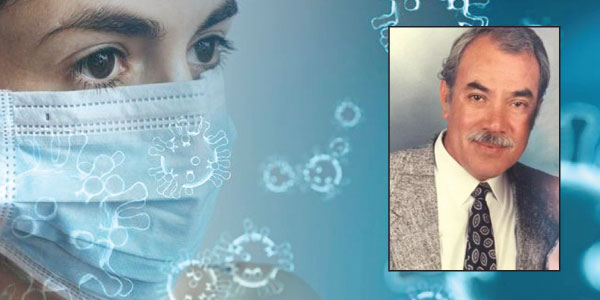
By Angie Baldelomar
Anxiety might be the rising problem around the world.
For psychiatrist Mauro Rodriguez, anxiety is the one of the biggest problems people face. The pandemic has only made life more difficult for almost everyone and added more stress to “an already stressful life,” Rodriguez said.
Rodriguez — who treats children, teens and adults — said he has seen a definite increase, particularly in the number of children dealing with anxiety.
“If the parents are anxious or stressed, children might not know why, but they feel the stress,” he said.
With more than 40 years’ experience in his field, Rodriguez still works part time seeing patients over Zoom. He and his wife have already gotten the COVID-19 vaccine, which he encourages everyone who can to get it, and plans to volunteer to administer vaccines to others.
In some cases, medicine is needed to handle anxiety, Rodriguez acknowledges. Still, he recommends always trying non-medicine solutions at first.
“It’s better that you try to manage your life without medicine because this stress won’t go away, even after the pandemic is over, because life is stressful,” he said. “Living causes a lot of pressure.”
In that regard, Rodriguez offers the following tips to handle anxiety during a pandemic:
*Talk to someone: Rodriguez considers this his most important advice for people dealing with anxiety. It can be a family member, a friend, someone from church or a therapist.
“The main thing is that you talk to someone,” he said. “It helps you find what exactly is stressing you, what your triggers are and it lets a weight off of you.”
It is important to have a support system and remember that many people are feeling the same way and there are ways to manage it, Rodriguez said.
*Exercise: Doing physical activities during the day can help relax and reduce stress levels. If nothing else, Rodriguez recommends walking at least an hour four to five times a week.
“When you exercise, your body releases endorphins, which in turn help you relax, get better blood circulation and increase oxygen levels,” he said. “All of this also helps you sleep and sleep is important to reduce stress.”
*Eat healthy: There is a diet that Rodriguez recommends that he calls a diet for the brain, that helps people when they are stressed to regulate the nervous system. It consists of consuming lots of protein, omega-3 and vitamins.
“Seafood, in particular, has a lot of these proteins; also, eat everything that has omega-3, such as nuts and avocado, because it will help you to regulate your brain’s chemical balance,” he said.
*For children and teens, control screen time: The recommended amount of screen time is two hours a day, though Rodriguez recognizes that might be an exaggeration because everyone uses it for far longer than that. But the number serves as a reference.
*Rest: This is particularly important for teens and children. Rodriguez recommends they get between nine and 11 hours of sleep so their bodies can rest, and their brains can reboot and develop better.
Experto comparte consejos sobre cómo manejar la ansiedad durante una pandemia
La ansiedad podría ser el problema creciente en todo el mundo.
Para el psiquiatra Mauro Rodríguez, la ansiedad es uno de los mayores problemas que enfrenta la gente. La pandemia sólo ha hecho la vida más difícil para casi todos y ha agregado más estrés a “una vida que ya es estresante”, dijo Rodríguez.
Rodríguez, que trata a niños, adolescentes y adultos, dijo que ha visto un aumento definitivo, particularmente en la cantidad de niños que padecen ansiedad.
“Si los padres están ansiosos o estresados, es posible que los niños no sepan por qué, pero sienten el estrés”, dijo.
Con más de 40 años de experiencia en su campo, Rodríguez todavía trabaja a tiempo parcial atendiendo pacientes a través de Zoom. Él y su esposa ya recibieron la vacuna COVID-19, que él anima a todos los que puedan a recibirla, y planea ofrecerse como voluntarios para administrar vacunas a otras personas.
En algunos casos, se necesitan medicamentos para manejar la ansiedad, reconoce Rodríguez. Aún así, recomienda probar siempre soluciones no medicinales al principio.
“Es mejor que intente manejar su vida sin medicamentos porque este estrés no desaparecerá, incluso después de que termine la pandemia, porque la vida es estresante”, dijo. “Vivir genera mucha presión”.
En ese sentido, Rodríguez ofrece los siguientes consejos para manejar la ansiedad durante una pandemia:
*Habla con alguien: Rodríguez considera que este es su consejo más importante para las personas que padecen ansiedad. Puede ser un familiar, un amigo, alguien de la iglesia o un terapeuta.
“Lo principal es que hablas con alguien”, dijo. “Te ayuda a encontrar qué es exactamente lo que te está estresando, cuáles son tus desencadenantes y te quita un peso de encima”.
Es importante tener un sistema de apoyo y recordar que muchas personas sienten lo mismo y hay formas de manejarlo, dijo Rodríguez.
*Hacer ejercicio: realizar actividades físicas durante el día puede ayudar a relajarse y reducir los niveles de estrés. Al menos, Rodríguez recomienda caminar al menos una hora de cuatro a cinco veces por semana.
“Cuando hace ejercicio, su cuerpo libera endorfinas, que a su vez lo ayudan a relajarse, mejorar la circulación sanguínea y aumentar los niveles de oxígeno”, dijo. “Todo esto también te ayuda a dormir y dormir es importante para reducir el estrés”.
*Comer sano: Existe una dieta que Rodríguez recomienda que él llama dieta para el cerebro, que ayuda a las personas cuando están estresadas a regular el sistema nervioso. Consiste en consumir gran cantidad de proteínas, omega-3 y vitaminas.
“Los mariscos, en particular, tienen muchas de estas proteínas; además, coma todo lo que tenga omega-3, como nueces y aguacate, porque le ayudará a regular el equilibrio químico de su cerebro”, dijo.
*Para niños y adolescentes, controle el tiempo frente a la pantalla: la cantidad recomendada de tiempo frente a la pantalla es de dos horas al día, aunque Rodríguez reconoce que podría ser una exageración porque todos lo usan durante mucho más tiempo. Pero el número sirve de referencia.
*Descansar: esto es particularmente importante para los adolescentes y los niños. Rodríguez recomienda que duerman entre nueve y 11 horas para que sus cuerpos puedan descansar y sus cerebros puedan reiniciarse y desarrollarse mejor.









